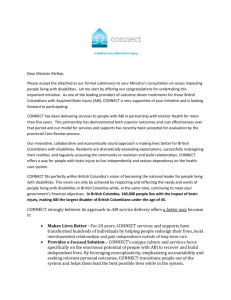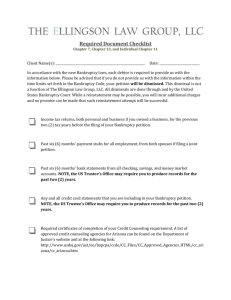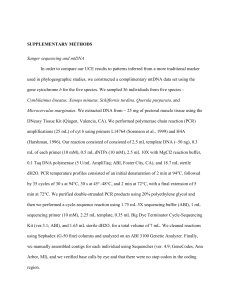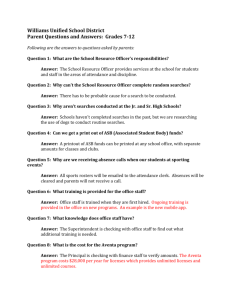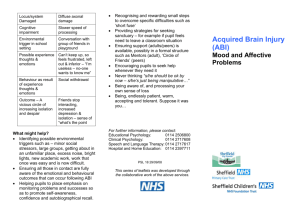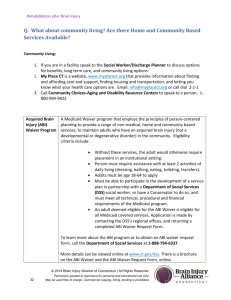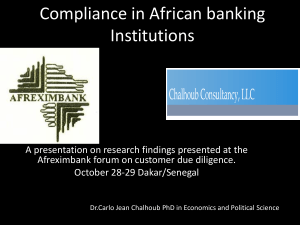I Chapter 8 Humor B J. S
advertisement
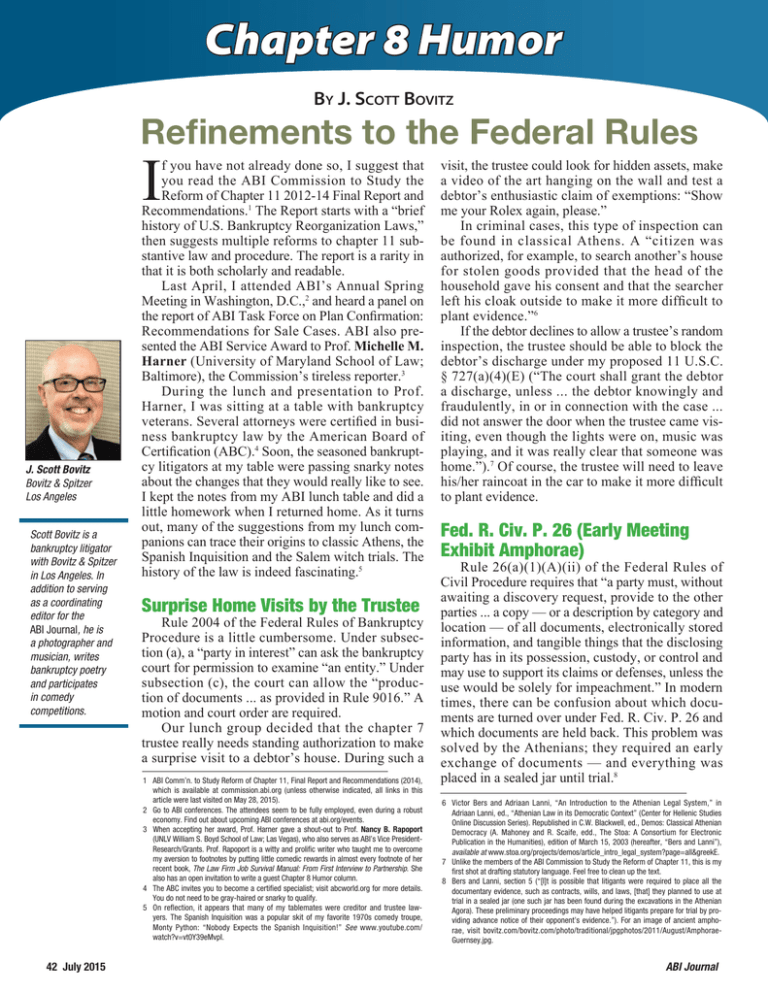
Chapter 8 Humor BY J. SCOTT BOVITZ Refinements to the Federal Rules I J. Scott Bovitz Bovitz & Spitzer Los Angeles Scott Bovitz is a bankruptcy litigator with Bovitz & Spitzer in Los Angeles. In addition to serving as a coordinating editor for the ABI Journal, he is a photographer and musician, writes bankruptcy poetry and participates in comedy competitions. f you have not already done so, I suggest that you read the ABI Commission to Study the Reform of Chapter 11 2012-14 Final Report and Recommendations.1 The Report starts with a “brief history of U.S. Bankruptcy Reorganization Laws,” then suggests multiple reforms to chapter 11 substantive law and procedure. The report is a rarity in that it is both scholarly and readable. Last April, I attended ABI’s Annual Spring Meeting in Washington, D.C.,2 and heard a panel on the report of ABI Task Force on 3lan Con¿rmation Recommendations for Sale Cases. ABI also presented the ABI Service Award to Prof. Michelle M. Harner (University of Maryland School of Law; Baltimore), the Commission’s tireless reporter.3 During the lunch and presentation to Prof. Harner, I was sitting at a table with bankruptcy veterans. Several attorneys were certi¿ed in business bankruptcy law by the American Board of Certi¿cation (ABC).4 Soon, the seasoned bankruptcy litigators at my table were passing snarky notes about the changes that they would really like to see. I kept the notes from my ABI lunch table and did a little homework when I returned home. As it turns out, many of the suggestions from my lunch companions can trace their origins to classic Athens, the Spanish Inquisition and the Salem witch trials. The history of the law is indeed fascinating.5 Surprise Home Visits by the Trustee Rule 2004 of the Federal Rules of Bankruptcy Procedure is a little cumbersome. Under subsection (a), a “party in interest” can ask the bankruptcy court for permission to examine “an entity.” Under subsection (c), the court can allow the “production of documents ... as provided in Rule 9016.” A motion and court order are required. Our lunch group decided that the chapter 7 trustee really needs standing authorization to make a surprise visit to a debtor’s house. During such a 1 ABI Comm’n. to Study Reform of Chapter 11, Final Report and Recommendations (2014), which is available at commission.abi.org (unless otherwise indicated, all links in this article were last visited on May 28, 2015). 2 Go to ABI conferences. The attendees seem to be fully employed, even during a robust economy. Find out about upcoming ABI conferences at abi.org/events. 3 When accepting her award, Prof. Harner gave a shout-out to Prof. Nancy B. Rapoport (UNLV William S. Boyd School of Law; Las Vegas), who also serves as ABI’s Vice PresidentResearch/Grants. Prof. Rapoport is a witty and prolific writer who taught me to overcome my aversion to footnotes by putting little comedic rewards in almost every footnote of her recent book, The Law Firm Job Survival Manual: From First Interview to Partnership. She also has an open invitation to write a guest Chapter 8 Humor column. 4 The ABC invites you to become a certified specialist; visit abcworld.org for more details. You do not need to be gray-haired or snarky to qualify. 5 On reflection, it appears that many of my tablemates were creditor and trustee lawyers. The Spanish Inquisition was a popular skit of my favorite 1970s comedy troupe, Monty Python: “Nobody Expects the Spanish Inquisition!” See www.youtube.com/ watch?v=vt0Y39eMvpI. 42 July 2015 visit, the trustee could look for hidden assets, make a video of the art hanging on the wall and test a debtor’s enthusiastic claim of exemptions “Show me your Rolex again, please.” In criminal cases, this type of inspection can be found in classical Athens. A “citizen was authorized, for example, to search another’s house for stolen goods provided that the head of the household gave his consent and that the searcher left his cloak outside to make it more dif¿cult to plant evidence.”6 If the debtor declines to allow a trustee’s random inspection, the trustee should be able to block the debtor’s discharge under my proposed 11 U.S.C. § 727(a)(4)(E) (“The court shall grant the debtor a discharge, unless ... the debtor knowingly and fraudulently, in or in connection with the case ... did not answer the door when the trustee came visiting, even though the lights were on, music was playing, and it was really clear that someone was home.”).7 Of course, the trustee will need to leave hisher raincoat in the car to make it more dif¿cult to plant evidence. Fed. R. Civ. P. 26 (Early Meeting Exhibit Amphorae) Rule 26 (a) (1) (A) (ii) of the Federal Rules of Civil Procedure requires that “a party must, without awaiting a discovery request, provide to the other parties ... a copy — or a description by category and location — of all documents, electronically stored information, and tangible things that the disclosing party has in its possession, custody, or control and may use to support its claims or defenses, unless the use would be solely for impeachment.” In modern times, there can be confusion about which documents are turned over under Fed. R. Civ. P. 26 and which documents are held back. This problem was solved by the Athenians; they required an early exchange of documents — and everything was placed in a sealed jar until trial.8 6 Victor Bers and Adriaan Lanni, “An Introduction to the Athenian Legal System,” in Adriaan Lanni, ed., “Athenian Law in its Democratic Context” (Center for Hellenic Studies Online Discussion Series). Republished in C.W. Blackwell, ed., Demos: Classical Athenian Democracy (A. Mahoney and R. Scaife, edd., The Stoa: A Consortium for Electronic Publication in the Humanities), edition of March 15, 2003 (hereafter, “Bers and Lanni”), available at www.stoa.org/projects/demos/article_intro_legal_system?page=all&greekE. 7 Unlike the members of the ABI Commission to Study the Reform of Chapter 11, this is my first shot at drafting statutory language. Feel free to clean up the text. 8 Bers and Lanni, section 5 (“[I]t is possible that litigants were required to place all the documentary evidence, such as contracts, wills, and laws, [that] they planned to use at trial in a sealed jar (one such jar has been found during the excavations in the Athenian Agora). These preliminary proceedings may have helped litigants prepare for trial by providing advance notice of their opponent’s evidence.”). For an image of ancient amphorae, visit bovitz.com/bovitz.com/photo/traditional/jpgphotos/2011/August/AmphoraeGuernsey.jpg. ABI Journal After a straw vote, our table supported adoption of the “adversary jar” solution. In order to save on pottery, we would allow each side to put a thumb drive with PDF copies in a small glass jar. If a party’s available exhibits are not in the jar, those exhibits would be inadmissible at trial. Oral Argument (Chess Clocks, Hecklers and Such) My ABI tablemates complained about the inefficiencies of bankruptcy trials. In March, I was honored to join Hon. Vincent P. Zurzolo, former chief judge of the U.S. Bankruptcy Court for the Central District of California, on a panel. We discussed early meeting and pre-trial procedures. Judge Zurzolo spoke directly to the bankruptcy litigators of the Beverly Hills Bar Association “Be ef¿cient, direct and to the point.” Do not bore the judge; every bankruptcy judge has seen your type of dispute before. Judge Zurzolo would probably approve of the Athenian trial system. In Athens, trials “took place in or near the shopping district and served as a form of popular entertainment.... Each litigant was allotted a ¿xed amount of time to present his case. Some private cases were completed in less than an hour, and no trial lasted longer than a day.”9 How was this accomplished? By limiting the time allotted to oral argument! “Speaking time was measured by means of a water-clock, a simple device whereby a set amount of water Àowed through a hole in one pot into a second pot placed below it. A plug was used to stop the water during the reading of laws and evidence. A fragment of one waterclock survives.”10 The modern equivalent of the Athenian water clock is the chess or game clock.11 In a tournament, all of the moves must be completed before the chess clock’s red Àag drops. The Àag is to prevent arguments over the exact moment that the time allotment is over.12 As the second-place runner-up to the Loyola Law School chess tournament of 1980, I have personal knowledge of this strict rule.13 The Bankruptcy Appellate Panel and Ninth Circuit Court of Appeals conduct many of their hearings at the Richard H. Chambers Courthouse in Pasadena, Calif. The panel controls a digital timer on the podium, to limit the time of oral argument by each side. The clock is a good idea, but litigants miss the fun of emphasizing a great point by punching the chess (trial) clock with a loud slap of the hand. “And with that killer legal argument, I reserve the balance of my time for rebuttal!” Slap!14 9 Id. at p. 6. 10 Id. 11 “A game clock consists of two adjacent clocks with buttons to stop one clock while starting the other, so that the two clocks never run simultaneously. Game clocks are used in two-player games where the players move in turn. The purpose is to keep track of the total time each player takes for his or her own moves, and ensure that neither player overly delays the game.” See en.wikipedia.org/wiki/Game_clock. 12 “A game played under time control will end as a loss for a player who uses up all of their allotted time, unless the opponent cannot possibly checkmate him.” See “Time Control,” Wikipedia, available at en.wikipedia.org/wiki/Rules_of_chess#Time_control. 13 Loyola Law School does not have a record of the 1980 chess tournament. Since I could not find a photo of the Class of 1980 in the law library, the missing chess history is not surprising. However, I was the organizer of the chess tournament. My painful memory of the tournament loss was eased a bit when my opponent failed to pass the bar exam on his initial try. 14 The Ninth Circuit Court of Appeals suggests that “[j]okes will generally fall flat and just annoy the panel.” So please do not mention my association with the Chapter 8 Humor column to my appellate panels. Then again, the court of appeals also suggests that you should never “[s]hout or point your finger at the bench.” Those nonbankruptcy appeals must get pretty testy. See The Appellate Lawyer Representatives’ Guide, p. 72 (Aug. 26, 2014), available at cdn.ca9.uscourts.gov/datastore/general/2015/05/06/ Final_2014_ALR_Practice_Guide_82514.pdf. ABI Journal One of my ABI companions suggested that interruptions should be allowed “from the peanut gallery” like we ¿nd on “reality” courtroom television shows. This also has its foundation in Athens. The laws were inscribed on large stone blocks erected in various public areas of Athens ... but there was no obligation to explain the relevant laws, and in fact, some speeches do not cite any laws at all. There was no formal mechanism to prevent a speaker from misrepresenting the laws, though knowledgeable members of the jury and the crowd could heckle orators whose speeches were misleading ... the Athenian jury panels were often raucous, and it is very likely that the crowd standing around at many trials augmented the hubbub of shouts, murmurs, and catcalls.15 Today, only the lawyer for the other guy is entitled to make a catcall during testimony (and only in the form of a sharp evidentiary objection). However, evidentiary objections can really slow down a trial. On balance, chess clocks should be used at trial. The chess clock is a quick ¿x for silly evidentiary objections, ponti¿cation, unnecessary exhibits and a host of other problems. If the parties estimate a one-day trial, each side should get 3.5 hours for presentation, period. After some whispering back and forth, our table decided that a chess clock was already permitted under existing Fed. R. Civ. P. 16(c)(2)(L) (allowing “special procedures for managing potentially dif¿cult or protracted actions”) and Fed. R. Civ. P. 16(c)(2)(O) (“establishing a reasonable limit on the time allowed to present evidence”). Slippery Witnesses Every judge is required to determine when a witness is telling the truth. Sometimes, a witness’s memory is weak. Sometimes, a witness lies. How can we improve the judge’s chances of ¿nding the truth? One of our creditor lawyers suggested that the debtors should sit on very uncomfortable chairs at § 341(a) examinations. “Heck, how about harsh lights and sleep deprivation?,” suggested another. Here, too, there are lessons in history. In Athens, a slave was considered a poor witness. However, “slave testimony could be introduced ... if the evidence was obtained under torture. A slave’s powerful fear of his master would normally prevent him from testifying against him, hence his testimony would need to be ‘improved’ by an even stronger wish to end the physical pain to which the examiners subjected him.”16 At trials in the Spanish Inquisition, the “accused was required to testify, and he didn’t get a lawyer or any assistance.”17 The “goal of the inquisitor was always to extract a confession, or admission of guilt. Inquisitors ... were also speci¿cally trained in how to question them in confusing or leading ways.” Just like lawyers! Often, the accused wasn’t clever enough to answer the inquisitor’s questions and prove his innocence. But the inquisitor still needed a satisfactory confes15 Bers and Lanni at pp. 6, 8. 16 Id. at p. 6. 17 Shanna Freeman, “How the Spanish Inquisition Worked,” How Stuff Works, available at history. howstuffworks.com/historical-figures/spanish-inquisition2.htm. continued on page 73 July 2015 43 Chapter 8 Humor: Refinements to the Federal Rules from page 43 sion. Accused heretics could be imprisoned for years until one was obtained.... If the accused confessed while being tortured, he had to confess again while not under torture for the confession to count. Torture was only supposed to be used if all other attempts at obtaining proof of heresy had been exhausted.18 While some collection lawyers would advocate for a less-comfortable experience in the witness box, many studies show that witness distress does not generate truth.19 I was once deposed for nine days on a simple commercial foreclosure matter. Was that torture enough? Thank goodness for the 2000 amendments to Fed. R. Civ. P. 7030(d)(1) (“Unless otherwise stipulated or ordered by the court, a deposition is limited to 1 day of 7 hours.”). The Committee Notes on Rules even provide for lunch and restroom breaks “This limitation contemplates that there will be reasonable breaks during the day for lunch and other reasons, and that the only time to be counted is the time occupied by the actual deposition.” In Salem, Mass., an accusation could be made against a witch. If a witch did not confess, she was brought to trial. “Spectral testimony” was taken from eyewitnesses. “Much, but not all, of the evidence used against the accused was spectral evidence, or the testimony of the afflicted who claimed to see the apparition or the shape of the person who was allegedly afÀicting them.” For debtors, the spectral evidence would be the ball and chain created by their creditor’s claims.20 As an alternative, a witch cake was made with a possessed person’s urine and rye meal. The cake was fed to a dog. If the dog ate this disgusting concoction, and the witch cried out when the dog ate the cake, that was evidence of the witch’s guilt.21 The trier of fact tried to determine if a witch was in possession of evil books. I am going to start asking each of my witnesses about the last ¿ve or six books heshe has read.22 At our table, we discussed the Salem alternatives to those terrible witch trials between February 1692 and May 1693. Someone pulled the Wikipedia website and pointed out that the hysteria giving rise to the witch trials may have been a result of “convulsive ergotism caused by eating rye bread made from grain infected by the fungus Claviceps purpurea (a natural substance from which LSD is derived).”23 In the end, my conservative tablemates voted to keep the witness rules just as they are — for now. But I am de¿nitely going to start each deposition by asking the witness if he/she had rye bread for breakfast. abi 18 Id. 19 Darisu Rejali, “5 Myths About Torture and Truth,” Washington Post (Dec. 16, 2007), available at www.washingtonpost.com/wp-dyn/content/article/2007/12/13/AR2007121301303.html (“Truth is, it’s surprisingly hard to get anything under torture, true or false. For example, between 1500 and 1750, French prosecutors tried to torture confessions out of 785 individuals. Torture was legal back then.... Most of the time, the torturers were unable to get any statement whatsoever.”). 20 See “Accusations and Examinations Before Local Magistrates,” Wikipedia, available at en.wikipedia.org/ wiki/Salem_witch_trials#Accusations_and_examinations_before_local_magistrates. 21 Id. 22 Id. 23 Id. Copyright 2015 American Bankruptcy Institute. Please contact ABI at (703) 739-0800 for reprint permission. ABI Journal July 2015 73
